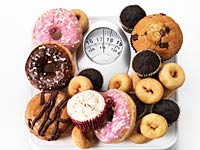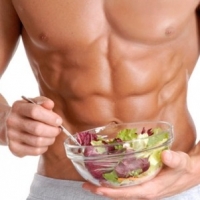Lose Weight > Weight Loss Tips > Weight Loss Articles > Fat Loss Nutrition - When Myths Become Big Fat Lies
Fat Loss Nutrition - When Myths Become Big Fat Lies
To understand fat loss nutrition, you need to understand the basics - the right fat loss nutrition combined with the right kind of exercise. The problem with many diets is that they are not balanced and so you cannot keep them going over the long-term. Then comes the crushing disappointment when dieting stops and the weight piles back on. The key to fat loss nutrition is to focus on eating right, rather than actual weight loss. For a 'balanced meal' you would be eating approximately 4 grams of carbohydrate and 1.5 grams of fat for every 3 grams of protein. What is crucial is the type of fat, carbohydrate and protein you eat.
Good Fats and Bad Fats
Quality fat, not low-fat, is the secret to fat loss nutrition. It is the 'trans' fats or hydrogenated fats in processed and fried foods which are the toxic fats that prevent weight loss. The American diet is also overloaded with omega-6 fats and these contribute to insulin resistance (more about that under Carbohydrates). To reach the ideal ratio of 1:1 omega-3 to omega-6, it is necessary to not only consume more omega-3 fats (in fish, fish-oil capsules, or flaxseed oil), but also to decrease the amount of omega-6 fats in your fat loss nutrition diet (vegetable oils, grain-fed beef and many processed foods).
Saturated fat has been demonised for so long that it is quite difficult to convince people otherwise. Coconut oil, which is a good saturated fat, has been shown to increase weight loss as it has the ability to help stimulate your metabolism and actually burn fat for energy. It also helps regulate blood sugar, an essential in weight loss - and it's good for your heart too!
Fat loss Nutrition Tip: Use coconut oil for cooking, and extra-virgin olive oil for salad dressings.
Fat Loss Nutrition: Carbohydrates
The key to fat loss nutrition is blood sugar balance. You need to reverse the insulin resistance that contributed by processed foods to burn off the fat. The excess of carbohydrates from our starchy and sugary diet is a far greater contributor to weight gain than the fat on its own. The combination of wrong fats and wrong carbohydrates is the route to an unhealthy lifestyle.
Bread, pasta, cereal, rice and potatoes, (and even corn) particularly as processed food, are consumed in excess. Great for the food industry, but not for you. They contribute to the over-production of insulin, leading to insulin-resistance. The over-refined carbohydrate creates a sugar surge in our blood and the body can only respond by converting it to fat and dumping it in the rolls of fat in our bulging stomachs.
Good old fiber is your fat loss nutrition weapon in the battle of the bulge. Good sources of fiber are brown rice, vegetables and whole grains.
Protein
Eating a little protein at each meal will help to slow down the digestion of carbohydrate, so you don't get that sugar surge. Of course this does not mean the high-fat burger and fries meal. Fat loss nutrition means the low-fat protein of lean white meat, fish, beans and lentils. Beware the low-fat processed foods like low-fat yogurts which are high in sugar.
A little bit of protein at every meal is an important fat loss nutrition approach to blood sugar balance. Even a handful of pumpkin seeds eaten with an apple can slow digestion and even out your metabolism.
Balance and Quality
Willpower is not really an issue with the fat loss nutrition approach, when you learn to balance your blood sugar. It is really all about the right balance and quality of foods, and the right exercise. You don't have to rely on the the low-fat, low-carb, high-protein, high-fat diet fads. Just avoid processed foods where you can and concentrate on the healthy foods. You will even find that hunger is not an issue when you practice fat loss nutrition.
Related Articles
-
Detoxify Your Body And Lose Weight With The Master Cleanse Detox
Stanley Burroughs Master Cleanse Detox has created a stir since its ad
-
Factors To Consider Regarding Risks Of Thigh Liposuction
Liposuction might sound like a miracle cure for intractable celluli
-
Discover a Cheap and Easy Solution for Burning Fat!
Discover a Cheap and Easy Solution for Burning Fat! Lose Half a Pound
-
The Answer to your Weight Loss Problems
Everyone wants to look great. A few people are conscious enough to mak
-
Every Other Day Diet Sample
Have you heard of a new method to lose weight intitled The Every Other
-
Participating In An Online Weight Loss Program
Have you ever heard of an online weight loss program before? If this i
- DON'T MISS
- What is the usual Liposuction Cost?
- Best Foods For Flat Abs - Ways To Trim Belly Fat That Work 20x Faster
- Your Guideline For Getting Six Pack Abs
- How to burn fat fast – tips on how to burn fat fast
- Weight Loss Advise For Dummies
- Obesity and Fat Control Myths
- A Safe and Painless Liposuction Alternative
- How To Get Toned Legs
- Natural Ways To Lose Excess Body Fat In Efficient Manner
- Oolong Tea Weight Loss - A Marvelous Drink!




